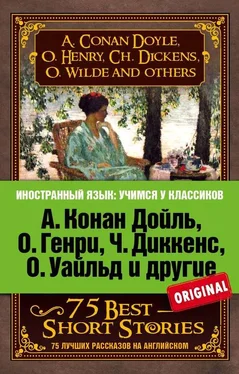The birds sang louder and louder. At last the sun came up bewilderingly bright. Sylvia could see the white sails of ships out at sea, and the clouds that were purple and rose-colored and yellow at first began to fade away. Where was the white heron’s nest in the sea of green branches, and was this wonderful sight and pageant of the world the only reward for having climbed to such a giddy height? Now look down again, Sylvia, where the green marsh is set among the shining birches and dark hemlocks; there where you saw the white heron once you will see him again; look, look! a white spot of him like a single floating feather comes up from the dead hemlock and grows larger, and rises, and comes close at last, and goes by the landmark pine with steady sweep of wing and outstretched slender neck and crested head. And wait! wait! do not move a foot or a finger, little girl, do not send an arrow of light and consciousness from your two eager eyes, for the heron has perched on a pine bough not far beyond yours, and cries back to his mate on the nest and plumes his feathers for the new day! The child gives a long sigh a minute later when a company of shouting cat-birds comes also to the tree, and vexed by their fluttering and lawlessness the solemn heron goes away. She knows his secret now, the wild, light, slender bird that floats and wavers, and goes back like an arrow presently to his home in the green world beneath. Then Sylvia, well satisfied, makes her perilous way down again, not daring to look far below the branch she stands on, ready to cry sometimes because her fingers ache and her lamed feet slip. Wondering over and over again what the stranger would say to her, and what he would think when she told him how to find his way straight to the heron’s nest.
‘Sylvy, Sylvy!’ called the busy old grandmother again and again, but nobody answered, and the small husk bed was empty and Sylvia had disappeared.
The guest waked from a dream, and remembering his day’s pleasure hurried to dress himself that might it sooner begin. He was sure from the way the shy little girl looked once or twice yesterday that she had at least seen the white heron, and now she must really be made to tell. Here she comes now, paler than ever, and her worn old frock is torn and tattered, and smeared with pine pitch. The grandmother and the sportsman stand in the door together and question her, and the splendid moment has come to speak of the dead hemlock-tree by the green marsh.
But Sylvia does not speak after all, though the old grandmother fretfully rebukes her, and the young man’s kind, appealing eyes are looking straight in her own. He can make them rich with money; he has promised it, and they are poor now. He is so well worth making happy, and he waits to hear the story she can tell.
No, she must keep silence! What is it that suddenly forbids her and makes her dumb? Has she been nine years growing and now, when the great world for the first time puts out a hand to her, must she thrust it aside for a bird’s sake? The murmur of the pine’s green branches is in her ears, she remembers how the white heron came flying through the golden air and how they watched the sea and the morning together, and Sylvia cannot speak; she cannot tell the heron’s secret and give its life away. Dear loyalty, that suffered a sharp pang as the guest went away disappointed later in the day that could have served and followed him and loved him as a dog loves! Many a night Sylvia heard the echo of his whistle haunting the pasture path as she came home with the loitering cow. She forgot even her sorrow at the sharp report of his gun and the sight of thrushes and sparrows dropping silent to the ground, their songs hushed and their pretty feathers stained and wet with blood. Were the birds better friends than their hunter might have been, – who can tell? Whatever treasures were lost to her, woodlands and summer-time, remember! Bring your gifts and graces and tell your secrets to this lonely country child!
The Boarding House (James Joyce)
Mrs. Mooney was a butcher’s daughter. She was a woman who was quite able to keep things to herself: a determined woman. She had married her father’s foreman and opened a butcher’s shop near Spring Gardens. But as soon as his father-in-law was dead Mr. Mooney began to go to the devil. He drank, plundered the till, ran headlong into debt. It was no use making him take the pledge: he was sure to break out again a few days after. By fighting his wife in the presence of customers and by buying bad meat he ruined his business. One night he went for his wife with the cleaver and she had to sleep in a neighbour’s house.
After that they lived apart. She went to the priest and got a separation from him with care of the children. She would give him neither money nor food nor house-room; and so he was obliged to enlist himself as a sheriff’s man. He was a shabby stooped little drunkard with a white face and a white moustache and white eyebrows, pencilled above his little eyes, which were veined and raw; and all day long he sat in the bailiff’s room, waiting to be put on a job. Mrs. Mooney, who had taken what remained of her money out of the butcher business and set up a boarding house in Hardwicke Street, was a big imposing woman. Her house had a floating population made up of tourists from Liverpool and the Isle of Man and, occasionally, artistes from the music halls. Its resident population was made up of clerks from the city. She governed the house cunningly and firmly, knew when to give credit, when to be stern and when to let things pass. All the resident young men spoke of her as The Madam.
Mrs. Mooney’s young men paid fifteen shillings a week for board and lodgings (beer or stout at dinner excluded). They shared in common tastes and occupations and for this reason they were very chummy with one another. They discussed with one another the chances of favourites and outsiders. Jack Mooney, the Madam’s son, who was clerk to a commission agent in Fleet Street, had the reputation of being a hard case. He was fond of using soldiers’ obscenities: usually he came home in the small hours. When he met his friends he had always a good one to tell them and he was always sure to be on to a good thing – that is to say, a likely horse or a likely artiste. He was also handy with the mits and sang comic songs. On Sunday nights there would often be a reunion in Mrs. Mooney’s front drawing-room. The music-hall artistes would oblige; and Sheridan played waltzes and polkas and vamped accompaniments. Polly Mooney, the Madam’s daughter, would also sing. She sang:
I’m a. . naughty girl.
You needn’t sham:
You know I am.
Polly was a slim girl of nineteen; she had light soft hair and a small full mouth. Her eyes, which were grey with a shade of green through them, had a habit of glancing upwards when she spoke with anyone, which made her look like a little perverse madonna. Mrs. Mooney had first sent her daughter to be a typist in a corn-factor’s office but, as a disreputable sheriff’s man used to come every other day to the office, asking to be allowed to say a word to his daughter, she had taken her daughter home again and set her to do housework. As Polly was very lively the intention was to give her the run of the young men. Besides, young men like to feel that there is a young woman not very far away. Polly, of course, flirted with the young men but Mrs. Mooney, who was a shrewd judge, knew that the young men were only passing the time away: none of them meant business. Things went on so for a long time and Mrs. Mooney began to think of sending Polly back to typewriting when she noticed that something was going on between Polly and one of the young men. She watched the pair and kept her own counsel.
Polly knew that she was being watched, but still her mother’s persistent silence could not be misunderstood. There had been no open complicity between mother and daughter, no open understanding but, though people in the house began to talk of the affair, still Mrs. Mooney did not intervene. Polly began to grow a little strange in her manner and the young man was evidently perturbed. At last, when she judged it to be the right moment, Mrs. Mooney intervened. She dealt with moral problems as a cleaver deals with meat: and in this case she had made up her mind.
Читать дальше
Конец ознакомительного отрывка
Купить книгу












